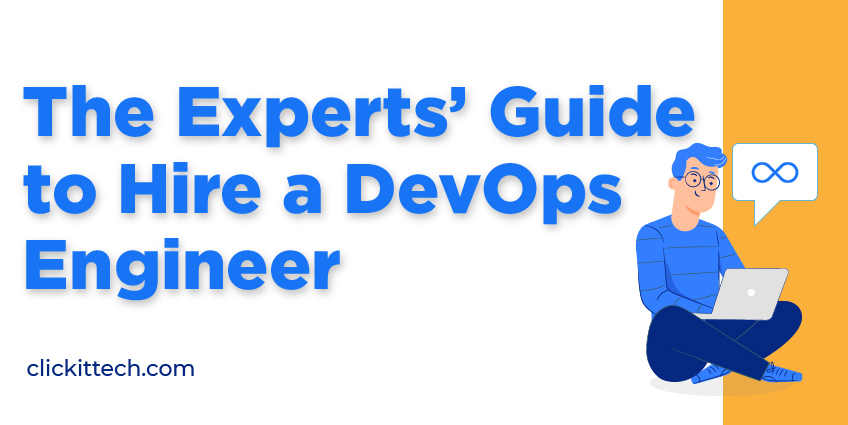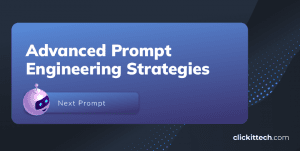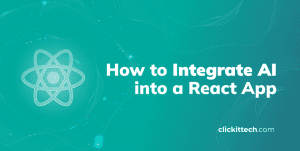In this post, we will be taking a look at the techniques and tactics you can use to hire a DevOps engineer without breaking your budget. Gartner’s study indicates that by 2025, over 85% of enterprises will adopt the cloud-first philosophy. We used to think senior software engineers were expensive, however, these days to hire a DevOps developer is the most expensive hire in the IT world. Not only are DevOps engineers expensive, but they can also be quite hard to find in light of the massive demand and lack of education at universities in DevOps practices, deep Linux administration and Cloud practices.
Additionally, most college students take the software engineer path instead of the DevOps engineer path.
So, how can you find and hire a DevOps engineer in these complicated times? You’ve come to the right place! In this blog we will guide you on how to successfully hire a DevOps developer.
Table of Content
- DevOps Engineer Roles and Responsibilities Video
- Why Should you Hire a DevOps Engineer?
- What does a DevOps Engineer do?
- DevOps Engineer Principal Tasks and Responsibilities
- DevOps Engineer Roles
- Skills Required for a DevOps Engineer
- Soft Skills Needed for a DevOps Engineer
- How to hire a DevOps engineer Just Looking at their CV
- Interview Questions to Hire DevOps Engineer
- How Much Does it Cost to Hire DevOps Engineer?
- Why Choose ClickIT to Hire DevOps Engineer?
- Companies that Hire DevOps Engineers with ClickIT
- The Voice of Our Customers
- To Conclude
- FAQ of How to Hire DevOps Engineer
DevOps Engineer Roles and Responsibilities Video
Why Should You Hire DevOps Developer?
You need a DevOps engineer with good skills in Automation, Infrastructure as Code ( IaC ), Continuous Integration and Continuous Delivery, Cloud Expertise, and a deep understanding of the Linux O.S (or windows / .net ecosystem). The DevOps engineer will also need other skills mentioned further in this article. Suppose you have a web application or digital product with multiple environments and services (back end and front-end).
Are you interested in improving your web development productivity or scaling your web application?
Are you planning to distribute your system and services?
If you answered yes to any of the above, you need a DevOps engineer with good skills in Automation, Infrastructure as Code ( IaC ), Continuous Integration and Continuous Delivery, Cloud Expertise, and a deep understanding of the Linux O.S (or windows / .net ecosystem). The DevOps engineer will also need other skills mentioned further in this article.
In a nutshell, this is what DevOps developers do:
What does a DevOps Engineer do?
As a former DevOps engineer, let me explain what it is exactly what we do. Before the appearance of the DevOps term, we had Network engineers, Security engineers, System administrators (Unix and Linux admins), and Automation engineers. These positions integrating Cloud and DevOps practices have evolved into a single position: DevOps engineer.
- Automates infrastructure tasks via IaC or bash/python scripting
- Maintaining and configuring a cluster of servers
- Create and sustains CI-CD pipelines
- Secure servers and cloud services.
Furthermore, DevOps are masters of Linux and know how to create highly distributed systems using the AWS cloud (or any cloud) with microservices, Kubernetes, Amazon ECS/Fargate, or just virtual on-premise servers.
Most importantly, they are the gurus of cloud services. They know how to integrate any AWS managed service, including Amazon RDS, Aurora, Amazon S3, or even a cloud networking issue (VPC Networking). Also, if you have an intruder in your systems, a server hack, or a classic Jenkins/WordPress hack, they are usually the ones to investigate and inspect the root cause, find the vulnerability, and provide the analysis and remedy.
This is what our DevOps developers in Mexico and Latam do best! – Hire a DevOps Developer now!

DevOps developers can also be in charge of Code release management and troubleshooting production deployments. They can also take on the tasks of a site reliability engineer, including maintaining servers, triaging server production issues, and attending to any server alert (they are usually on an on-call schedule). These sound like tasks for a DevOps engineer, right? Indeed, sometimes site reliability engineers do DevOps stuff, and vice versa.
Do you better understand now why it’s important to have a DevOps engineer within your organization? It’s common for bold software engineers or tech leaders to take on these responsibilities (DevOps tasks). Instead of randomly using your software engineer who was mostly trained in developing features, you should take your DevOps strategy to the next level and hire a DevOps engineer.
Read our blog on How to build a software development team.
DevOps Engineer Principal Tasks and Responsibilities
Now that you understand how a DevOps engineer benefits an organization, let’s review their specific tasks.
1. Continuous Integration and Continuous Delivery (CI/CD)
Create, design, and maintain Continuous Integration and Continuous Delivery pipeline in Jenkins, Gitlab, CircleCI, or AWS CodePipeline. A DevOps engineer can find ways to decrease the deployment time from hours to minutes! Do you need a deployment on the weekend? They can take care of this as well, as long as you schedule it in advance!
2. Automate and Script Repetitive Tasks
Bash and Python scripting automate your infrastructure, servers, containers, cronjobs, or any process that a DevOps engineer can codify.
3. Maintain and Deploy Infrastructure
DevOps can bring new production environments with Terraform or Cloudformation. Also, because of their good knowledge in Infrastructure as Code (IaC), they can maintain and deploy infrastructure through IaC tools.
4. Security and Hardening
DevOps can also handle security incidents including hacks, security audits, hardening of servers, and user security controls such as AWS accounts, SSH keys, Linux/Unix privileges, permissions, SSL certs, encryption, and API key encryption (Amazon KMS, for example).
5. Troubleshoot any Linux instance
Is DNS a problem? Server? Networking? Are emails not working? Probably an AWS DevOps Engineer can help. After all, he is the Linux guru. As a Windows or .net-based app, he should be good at maintaining Windows servers with similar responsibilities.
6. Cloud Networks Tasks
DevOps know how to interconnect different VPC networks, troubleshoot networking issues, deploy VPN services, and create virtual networks.
7. Dockerize Open Source Applications
The DevOps engineer creates microservices architectures for your enterprise SaaS application. Our blog on how to dockerize a Python/Flask app may be helpful.
8. Kubernetes Clustering
A DevOps developer can create a Kubernetes Cluster in production with Amazon EKS, Azure KS, or Google KS. We have created an article about creating a Kubernetes cluster on AWS that can help your DevOps engineer.
9. Security Compliance
Are you a Fintech health-care, or do you care about application security following PCI, HIPAA, ISO27001, or SOC2 regulations? Great! They can help you with all the technical qualifications from security compliance, creating a VPN, hardening containers, adopting DevSecOps, Vuln assessments, patching vulnerabilities, and disaster recovery strategies.
10. Back-end Development
DevOps engineers can work with Python, boto3, and AWS SDK for back-end and AWS development.
11. Application Troubleshooting
They can troubleshoot your web application, either Java, Node.js, Python, Go, or Laravel. Sometimes this falls more on the side of the Software engineer, but the DevOps engineer should be capable of understanding if it is a code issue or a DevOps issue and channeling it to the right tech team.
12. Maintain and Administer Database
The DevOps engineer is not the DBA expert per-se (SQL query expert) but has proficient knowledge to troubleshoot, create and build database clusters. Ex. Mysql, RDS replicas, PostgreSQL, MongoDB sharding, etc.
It is important to remember that a DevOps developer might not cover all these tasks. Usually, 50-70% of the above functions are suitable for a good senior AWS DevOps Engineer.
An added value for a DevOps Engineer: getting into the top DevOps Trends. Read the full blog here.
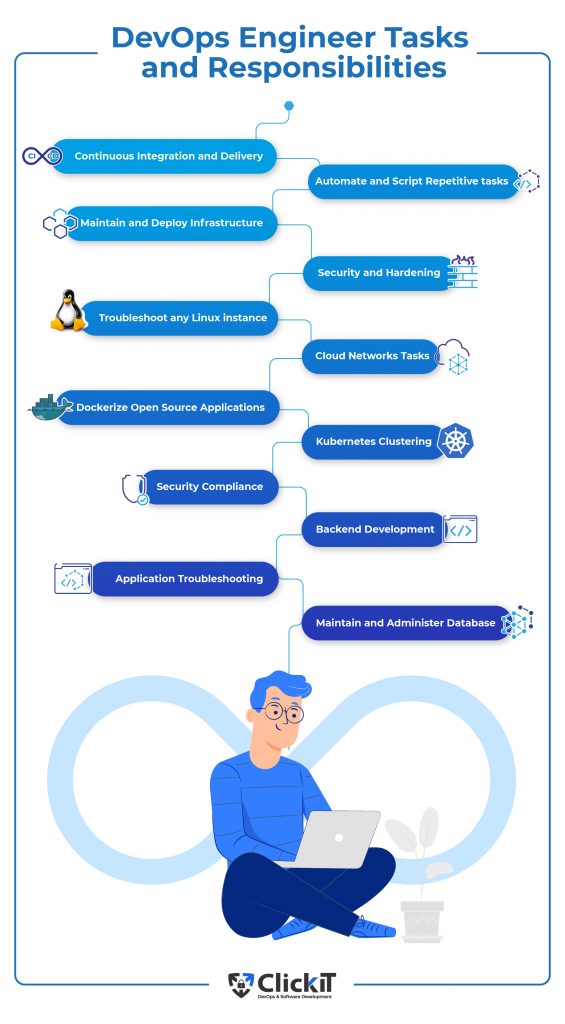
DevOps Engineer Roles
Most DevOps engineers are focused on DevOps practices and these are some of their roles:
- They can also be a Cloud engineer, which focuses on Cloud administration in one or two clouds including AWS, Azure, GCP, Digital Ocean, or on-premises.
- Linux administrator is another role common to DevOps which concentrates on maintaining Linux servers, open-source services, and server troubleshooting.
- DevOps engineers can also be focused on on-premise servers, which means they are concentrated on physical data centers and virtual environments (Vmware, Hyper-V, etc.).
- Finally, DevOps can be site reliability engineers (SRE). A person in this type of DevOps role usually maintains Linux servers and increases the reliability of the production systems. This person is also responsible for responding to on-call incidents and conducting Root Cause Analysis (RCA) on previous incidents. Sounds like a DevOps role, right?
Read our blog about SRE vs DevOps.
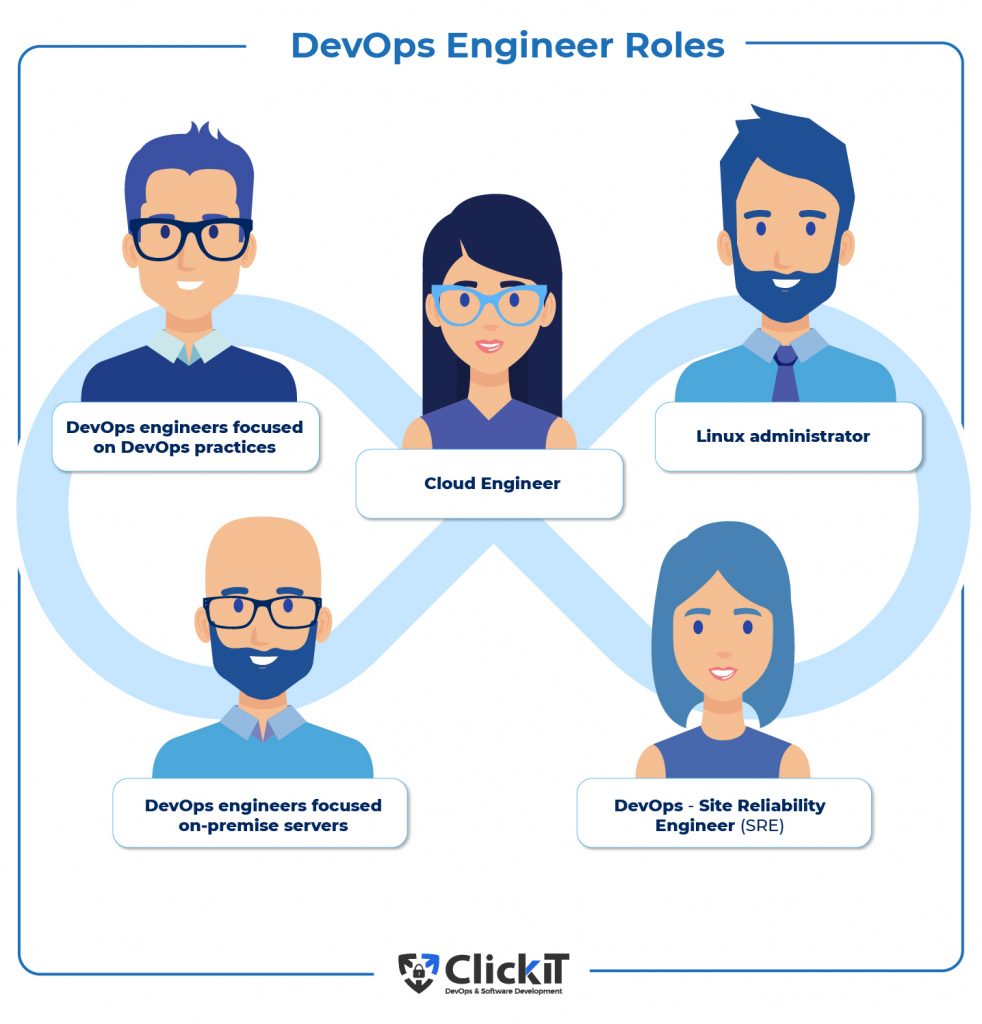
Are the tasks and roles of a DevOps Engineer and a Software Engineer the same? Find out in our full blog.
Skills You Must Review to Hire DevOps Engineer
- Linux Administration:
The DevOps should have 2-3 years of Linux administration experience.
- Knowledge of Open Source Services:
The candidate should also be very familiar with at least two open source services such as Apache, Nginx, PHP, MySQL, or PostgreSQL.
- Knowledge of Network Protocols:
A DevOps developer should understand network protocols, such as TCP/IP,networking, TCP, UDP, and HTTPS.
- The person should be knowledgeable on Bash or Python scripting.
- AWS Experience:
The DevOps should be familiar with at least one Cloud and have 2-3 years of experience in Amazon S3, VPC, EC2, ECS, IAM roles, and RDS.
- CI-CD Pipelines and Toolchain Knowledge:
The candidate must understand the SDLC and have the ability to create and maintain CI-CD pipelines. Must be proficient in at least one CI-CD tool.
- Basic Understanding of IaC Tools:
The DevOps should also know how to implement programs such as Terraform, CloudFormation, or Python. Knowing how to implement at least one should be mandatory.
- Ability to Deploy and Launch Web Application Stack:
For example: Java app, MERN stack, or Python / Django application.
- Troubleshoot Server Experience:
The candidate should have experience handling security incidents and EC2 instance issues.
- Basic Security Knowledge:
Any good DevOps should have basic knowledge of AWS security, Linux security, and hardening (Server / Containers).
- Proficient expertise in Docker and microservices.
- Knowledge on Amazon ECS or Fargate.
- Basic Understanding of how to Manage Databases:
The person should know how to manage at least one of the following three: Mysql, Postgresql, or Amazon RDS.
- Basic Monitoring Knowledge:
This includes Amazon Cloudwatch, Prometheus, Nagios, Zabbix, Grafana, DataDog, or New relic. The DevOps should be familiar with at least one of these tools.
Advanced Skills to look for when Hiring a DevOps Engineer
- DevOps Culture Adoption:
DevOps culture includes the whole DevOps practices landscape.
- Understand how to Apply the 12-Factor Methodology: This includes Isolated dependencies, backing services, Dev/Prod parity, stateless processes, etc. Visit our blog on the 12-factor methodology to learn everything you need to know on this subject.
- Kubernetes clustering: Skillful on Amazon EKS, Azure EKS, Google Kubernetes Service, and if it’s on-prem, Kubernetes Standalone. It’s great if the DevOps engineer is familiar with at least one of the technologies that applies to your project.
- Security compliance: It’s also a good asset if the DevOps is familiar with at least one of the following regulations: HIPAA, PCI, or SOC2.These regulations are all very similar. If you don’t need any security compliance, you can disregard this tech skill.
- Basic DevSecOps experience.
- Multi-tenant architecture: This applies to SaaS platforms and apps.
- Infrastructure as Code (IaC) Knowledge: A good DevOps should be knowledgeable in advanced practices and automation. This includes Terraform best practices and how to build production environments through Terraform or Cloudformation.
- Serverless CI CD pipeline Understanding: Being able to create and design for serverless apps such as Amazon and Lambda is an asset.
- Ability to troubleshoot: At least dozens of servers and microservices.
- Ability to create highly scalable systems in the cloud: This includes cloud-native architecture environments, AWS autoscaling, APIS autoscaling, Kubernetes clustering, stateless applications, and immutable infrastructure. To learn more about cloud-native architecture, take a look at our blog: What is Cloud Native Architecture?
- An AWS certification: This is an excellent and essential niche skill to have for complex projects however, it increases the hourly rate of the DevOps developer.
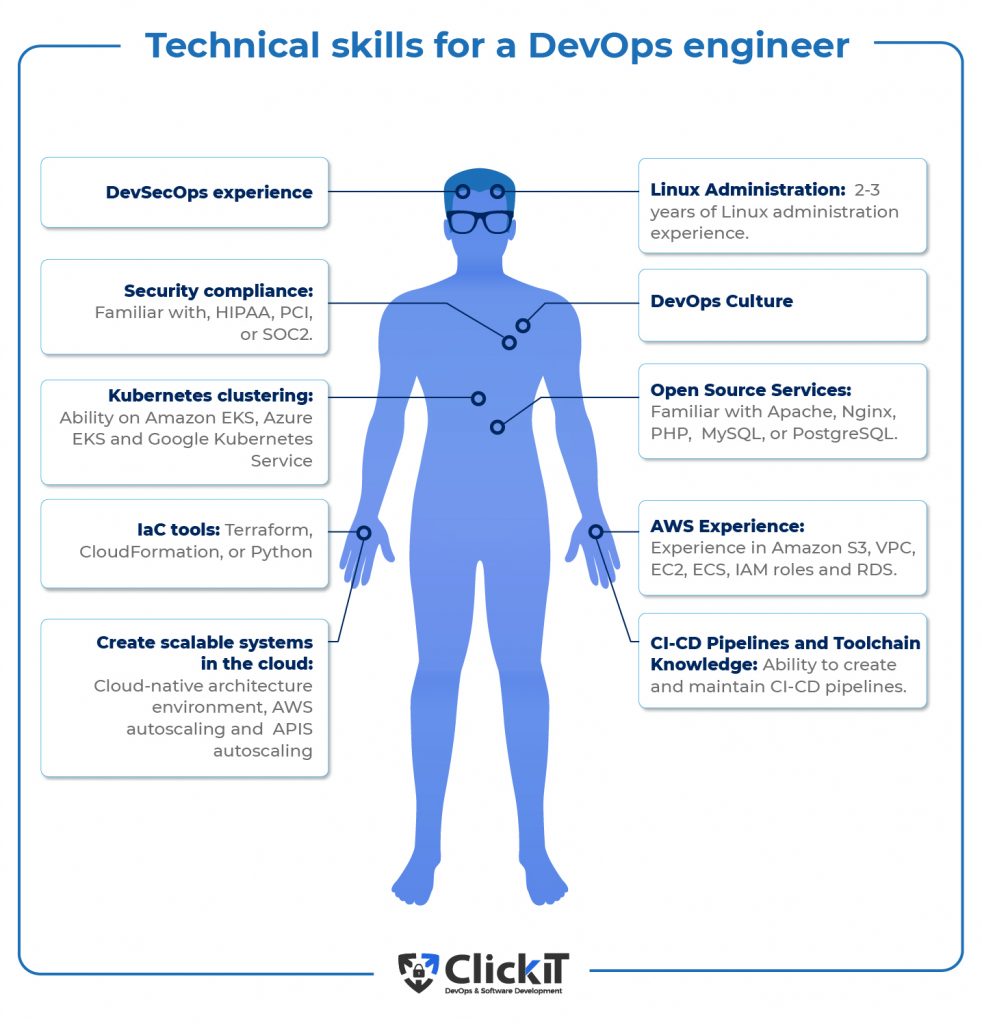
Soft Skills Needed for a DevOps Engineer
To hire a DevOps developer, it’s important to look further than simply the person’s technical experience and skills. Companies need to look for DevOps engineers with the soft skills required to be successful in the position.
Here are some key skills you should look for.
Good Communication
Good communication is a key skill for a DevOps engineer, seeing as they can be asked to work remotely. Virtual communication can be tricky and therefore, DevOps must have the ability to overcome any communication issues that may arise.
When faced with a problem, a good DevOps should be able to quickly determine its cause and come up with options for how to solve it. The ability to listen and understand the needs of a team is crucial when it comes to clear and productive communication.
Tools such as Slack, JIRA and Zoom can be helpful for remote collaboration.
Teamwork
The ability to work in harmony with a team has numerous benefits. First off, it’s essential for the creation of a coherent product.
A DevOps engineer needs to understand how the team works and be familiar with each member’s activities and skills. Collaborating in an understanding environment will result in good workflow and efficient processes with respect to the project or product. It’s no secret that with the proper teamwork mindset, development productivity can increase significantly.
Adaptability
The DevOps field is always changing and evolving, therefore, DevOps engineers need to be adaptable. Learning new things in order to grow expertise provides for flexible development, which can positively contribute to any project or problem that needs solving. You can discover adaptability capacity when you hire a Devops developer by analyzing their knowledge, courses and experience.
Leadership
In the process to hire a DevOps developer, the soft skills mentioned above can help you identify DevOps engineers with good leadership skills.
Developers face ongoing digital transformations and should therefore be able to identify problems and solve them, all while taking into account the team’s opinions with empathy and humility, as this is what allows for a productive work process. The right leadership style depends on how team members respond to essential changes in operations, technology, roles, and mindsets.
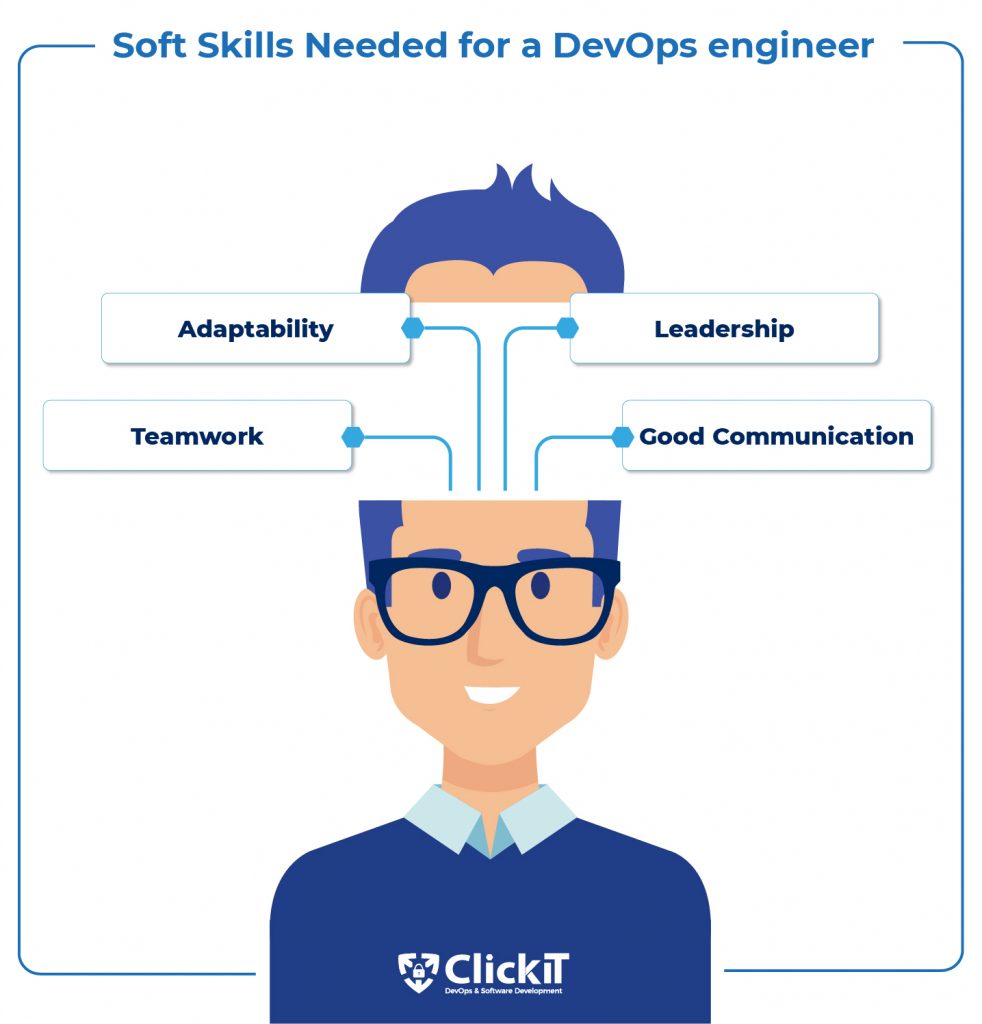
How to hire a DevOps engineer Just Looking at their CV
A good DevOps engineer can be defined in four aspects:
- Excellent knowledge of Linux servers and Networking.
- Very dynamic in managing AWS services, including Amazon S3, EBS, EC2, ECS and VPC.
- Love for automating with Bash, Python or IaC tools.
- Great communicator.
- DevOps certifications such as an AWS Certification (AWS Architect, SysOps, DevOps, or even Practitioner are good), a Terraform Certification, a Kubernetes Certification or a Docker Certification.
Make sure to consider the experience the candidate has with Linux or Windows servers. You want to hire a DevOps developer with at least 3-4 years of experience working as a DevOps engineer. Look for experience working with CI-CD tools and Cloud expertise. Also, your DevOps engineer should understand your programming language and platform.
Finally, determine if the candidate has the soft skills mentioned above, including communication, collaboration, the energy to change the SDLC within your tech team, and the ability to motivate your software engineers with new DevOps initiatives and practices.
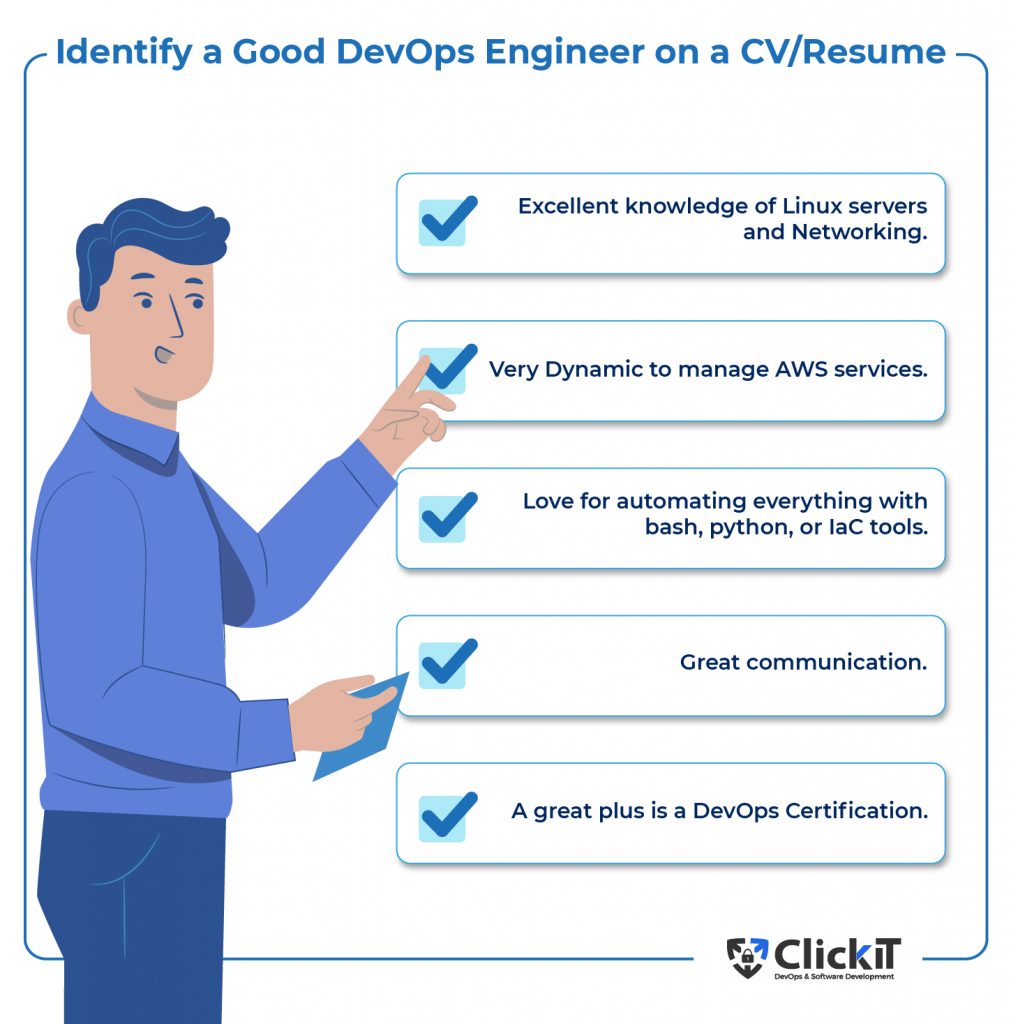
Good Interview Questions When Hiring DevOps Engineers
In the recruitment process to hire a DevOps developer, here are some questions that will help you get off to a good start during the interview process.
Linux Sysadmin experience
Questions about Linux, operative systems, open source services, etc.
- Specific questions on setting up a Vhost in Apache or Nginx.
- How to set up a redirect in Nginx or Apache.
- How to check memory, storage, disk usage, and CPU usage in Linux.
- What are the top 3 essential files to review logs in a Linux server?
- The server is crashing; how do you investigate the root cause?
- Please explain a couple parameters found in htop/top.
- What is Sar?
- What are the differences between a Soft link and a Hard link?
Troubleshoot Server, Linux, and DevOps issues
- Can you please walk me through your process when troubleshooting a web application that is currently DOWN. Please provide an example of a Linux instance, Kubernetes cluster, or a highly scalable monolith web app with EC2 and ECS. One environment with a scalable web app is enough.
- How would you troubleshoot a DNS problem?
Continuous Integration and Continuous Delivery (CI-CD) questions
- What is your experience with CI-CD tools?
- What is the difference between CI and CD?
- How would you optimize a CI-CD pipeline from 1-2 hrs to a few minutes? This question is broad, therefore the candidate may require more context.
- Walk me through the steps from the developer’s commits code (Git push) until the code is released in production (Live changes). This includes local dev, testing, and production with any CI-CD Tool including Jenkins, GitLab andAWS Code Pipeline.
- How does the git-flow process work? Can you walk me through it?
- Tell me about the Git branching model.
- Any basic Git related questions.
- How do you create a Jenkins job?
- How do you integrate Git with Jenkins or any other CI-CD tool that the DevOps engineer is familiar with?
Cloud Platform Fundamentals
Pick one: Questions about AWS, GCP, or Azure Cloud.
- What is the EC2 Instance Metadata?
- What are the differences between Amazon ECS, Fargate, and EKS?
- How do you set up an Application Load Balancer (ALB)?
- How do you set up AWS autoscaling, either with EC2 or ECS?
- How could you save costs in Amazon S3 Buckets?
- How do you interconnect two VPCs?
- How do you copy one AWS account to another AWS account (AWS resources, including ec2, rds, etc.)?
- How do you create an EBS snapshot?
- If you were asked to change the local images in /var/www/webapp/images/ into an Amazon S3 bucket, how would you do it? What would you change? What steps are involved?
- Tell me at least three ways to save or reduce AWS hosting costs on AWS.
Basic Programming Skills
Ask about scripting and automation in Bash or Python. Depending on the scripting language, ask them a few questions about their preferred DevOps language. For the purposes of this example, let’s use Bash.
- How do you take input from the terminal in Bash?
- How do you read the second word or column in each file line?
- Ask a question about awk or Sed.
- How do you execute a Bash file?
- How do you debug a shell script?
Infrastructure as Code (IaC)
Select one IaC tool, Terraform, CloudFormation, or Python automation, and ask questions about IaC tool experience and best practices.
Docker Microservice Architecture
- Ask about best practices for dockerization. How do you dockerize a React/Python/Node app? To learn more about dockerization, you can read our blog on. How to Dockerize a Node.js App.
- Ask questions about Docker commands.
- What are namespaces in Docker? This is an advanced question
Amazon ECS or Fargate
- How do you create an ECS cluster?
- Why is it necessary to launch tasks if you want to launch containers?
Kubernetes Clustering and Administration
Verify the candidate’s knowledge on Kubernetes. Depending on the cloud, ask questions about Amazon EKS, Azure EKS or Google Kubernetes Engine (GKE).
- Can you briefly describe what Kubernetes architecture consists of? Please mention components, parts, main configuration files, networking, etc. If the DevOps has trouble answering, maybe he or she should read this article: Kubernetes Architecture.
- Ask questions about the Kubectl command.
- What is Kubelet?
- What are the different types of services in Kubernetes? Make sure they mention Node port, Load balancer, Cluster IP, etc.
- What is Ingress and how does it work?
Experience in Deploying the Web Stack
Whether you’re using Node/React, Python, PHP, .NET, or Java, DevOps engineers should be familiar with how to deploy a web stack. It’s NOT a must, but you could potentially ask questions about specific configurations relating to your web stack.
Questions About your Database Engine
This includes Mysql, PostgreSQL, MongoDB, Amazon RDS and Aurora.
- How do you troubleshoot a Mysql Database?
- How do you tune/tweak a database? Explain a few parameters.
- What are the differences between Amazon Dynamodb and MongoDB?
- How do you create an Amazon RDS Replica?
- How do you add a user in Mysql?
Are you looking to create a cloud-native architecture or hire a DevOps developer? If so, watch this video about patterns, principles, and a quick strategy to build a cloud-native architecture.

How Much Does it Cost to Hire a DevOps Engineer?
To hire a DevOps developer, remember these rates: Nearshore senior DevOps engineers charge rates ranging from US$7,000 to $9,000 per month. On the other hand, a middle-range engineer charges anywhere from US$6,000 to $7,500 and a Junior DevOps charges US$4,000 to $5,500. All of this being said, it always depends on the person’s technical expertise and on their number of years of experience working in the IT world or as a DevOps engineer.
USA-based DevOps engineers charge US$120,000 – $150,000 per year on average, while the same roles have salaries of US$66,000 – $80,000 in Mexico. That being said, these engineers have a similar culture and similar knowledge. Mexican DevOps engineers are, therefore, more liable and cost-effective than offshore engineers.
We help companies save 40% to 60% off DevOps costs when compared to on-shore DevOps engineers based in the U.S region.
** These rates include Benefits, taxes, and perks.
** They are an average per seniority level.
** These rates are in USD.
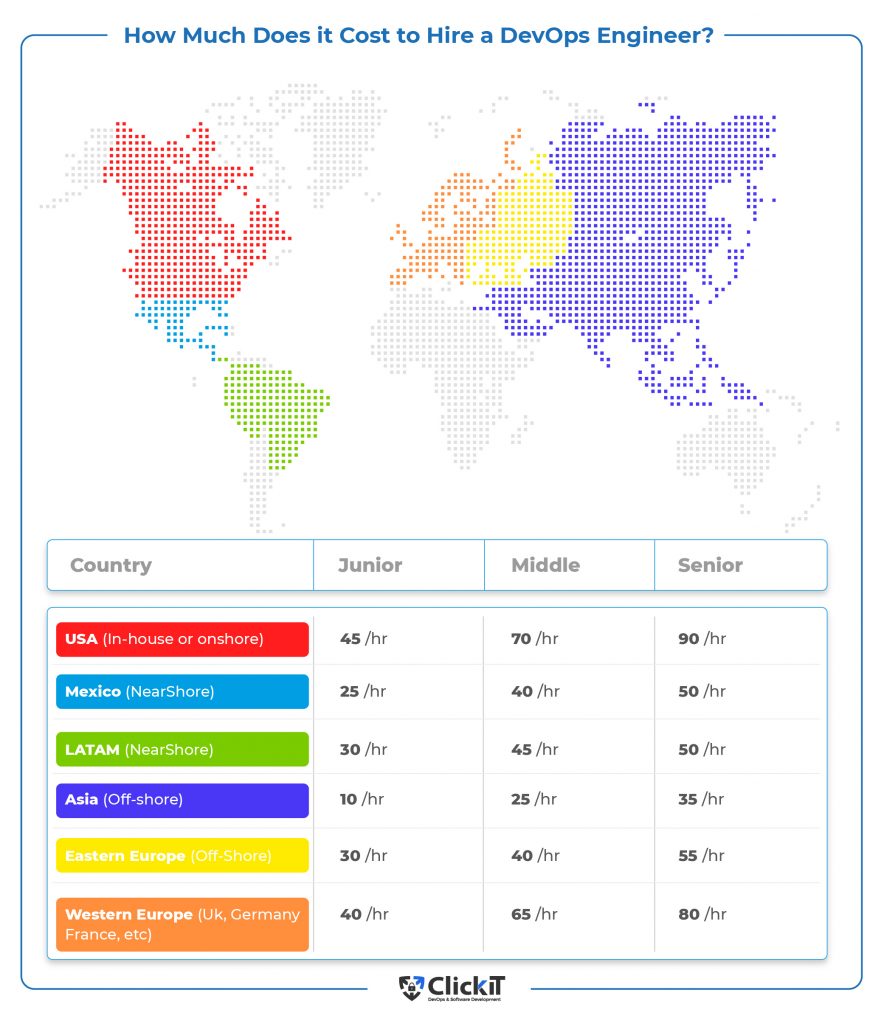
Why Choose ClickIT to Hire a DevOps Engineer?
In order to create an optimal DevOps team, you need to choose the best talent to manage and organize your projects across customer value streams. Choosing the right people for each task delivers the best results in the long run.
Every DevOps team needs a leader who knows the business processes and has impeccable technical expertise. You can hire a DevOps developer evangelist to fill this position. It’s also crucial to provide the team with the right tools.
To learn more on how to build an optimal DevOps team, check out our article on DevOps team roles and responsibilities.
ClickIT is an excellent option to hire a DevOps engineer or team. As a software development company, we continuously provide our customers with top-notch solutions, counting on our reliable team to help you automate your applications, decrease time to market, and increase efficiency while reducing IT costs.
We also count on an extension of dedicated DevOps, including site reliability engineers, cloud engineers, DevOps architects, security engineers, automation engineers , and DevOps evangelists.
Companies that Hire DevOps Engineers with ClickIT
Eplexity
Eplexity is a cloud management and consulting firm offering automated cloud architecture, cloud consulting, and cloud-managed services. ClickIT helped this company conduct an AWS assessment covering the five AWS pillars. Eplexity achieved the client’s requirements, and now the microservice and serverless ecosystem is running seamlessly and with top cloud practices.To learn more about this project, read our case study.
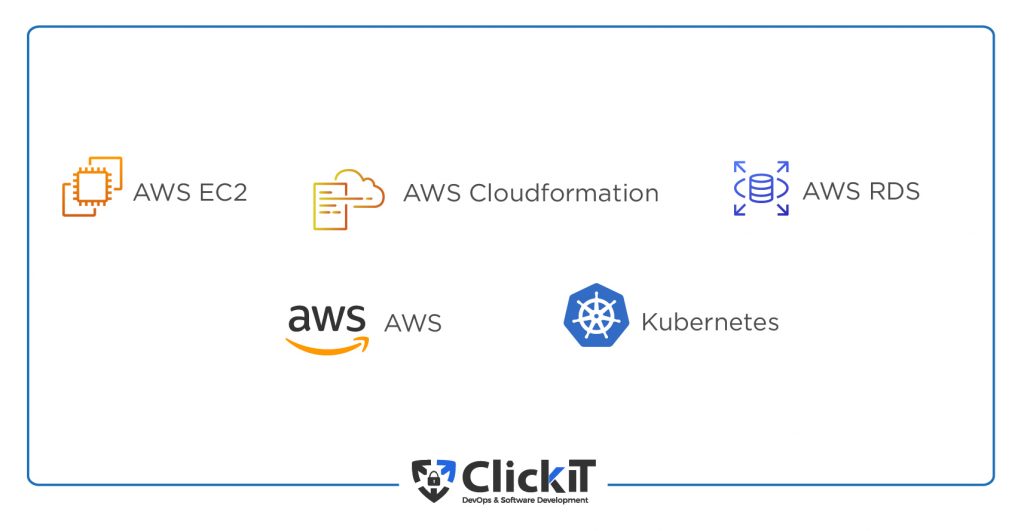
Bebop
Bebop provides DevOps services and manages the operations stage of many applications. We supported them by updating their Terraform templates in order to keep their production environments up to date and make them easier to manage and update. Now, the Bebop deployment processes with Terraform are more straightforward, the implementation times in the infrastructure are reduced, and managing the infrastructure is easier for new members. If you want to know more about this process,read our case study.
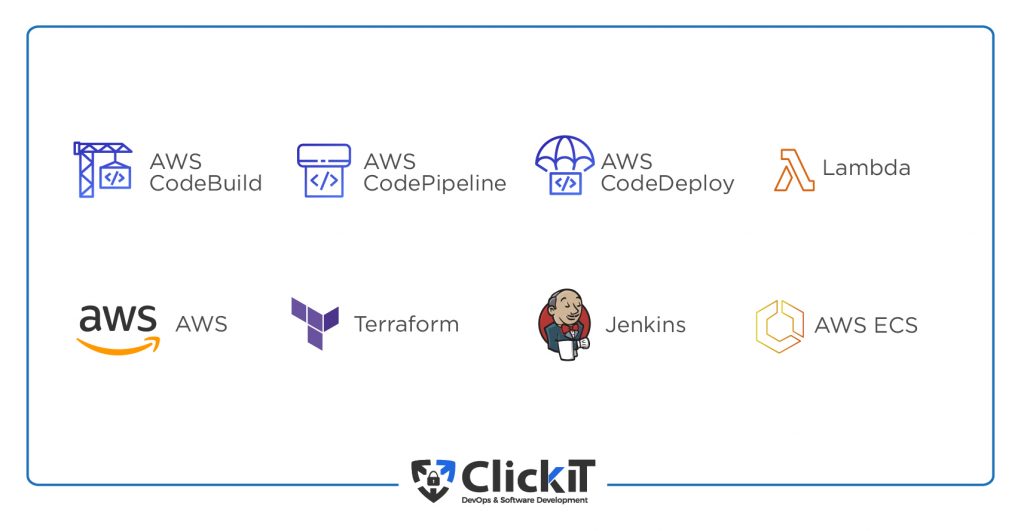
The Voice of our Customers
If you’re still unsure about where you can hire a DevOps developer or DevOps team, here are some reviews from ClickIT’s customers about DevOps projects so you can have a better idea of what to expect.
PCI Platform on AWS for Card-Dynamics
Card-Dynamics is a B2B platform that connects banks with e-commerce to update payment methods and create new users for merchants with verified banking information.
We had the opportunity to support them by building a PCI platform on AWS since our DevOps engineer has the necessary knowledge in Continuous Integration/Continuous Delivery models, Container Orchestration, Infrastructure as code, Server provisioning, Cloud monitoring, Cloud security, and PCI Compliance.
They were thrilled by the results, given that the audit date was advanced by a month. They were also very satisfied with the communication workflow throughout the process.
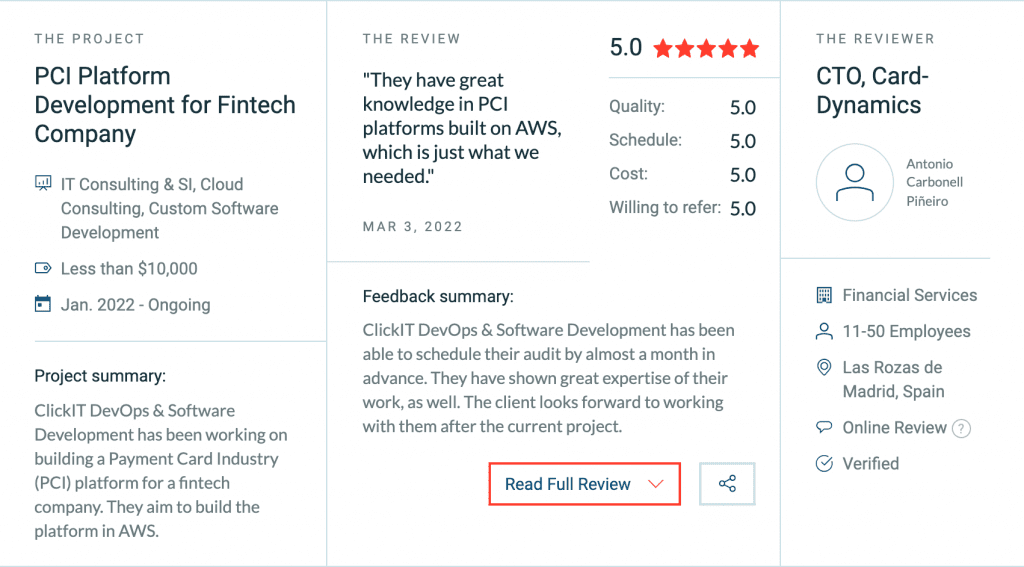
Staff Augmentation for Boundless
Boundless is a venture studio focused on B2B SaaS and building multiple software companies while partnering with aspiring and experienced entrepreneurs.
ClickIT assisted them with staff augmentation in projects that involved numerous greenfield development opportunities and in managing DevOps with cloud providers such as AWS, writing frontend and backend code and operating various technologies.
One of the outcomes of this collaboration was the creation of multiple products including the launch of the MVP and the continuous improvement of it with additional features. The adoption of the DevOps culture also resulted in a great outcome. Furthermore, the fact that the team has the same time zone and workdays helps the company deal with logistics and overlap.
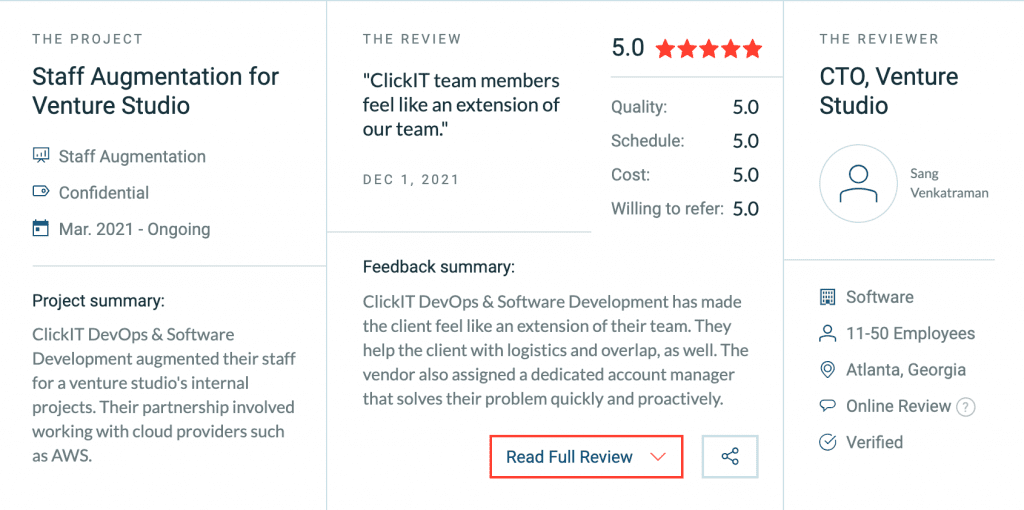
Hire a DevOps Engineer Conclusion
We know that hiring DevOps engineers can be complicated, however it’s not impossible. It’s best to have a DevOps developer within your organization, as they’re the gurus of cloud services and Linux. In order to hire a good DevOps engineer, you need to keep in mind that each DevOps has expertise and technical skills in specific languages. Also, don’t forget to consider soft skills in candidates which will ensure that they can effectively develop in the position.
Now that you know how to select the best DevOps engineers, you can contact ClickIT and find the proper DevOps developer for your projects. We have a pool of talented devs and our hiring process is quick and straightforward.

FAQ of How to Hire DevOps Engineer
Hiring a DevOps engineer involves a few steps, such as identifying in their CV/Resume, excellent knowledge of Linux servers and Networking, good communication, leadership, DevOps certification, management of AWS services, and Cloud expertise.
And ask questions that prove their expertise in their interview.
You need a DevOps engineer, if you have a web application or digital product with numerous environments services and are interested in enhancing your web development productivity or planning to distribute your system and services.
DevOps engineers can be in charge of code release management and troubleshooting any production deployment. Also, they can do the tasks of a site reliability engineer.
Some sites can be beneficial to hire a DevOps developer, like freelance portals: Upwork, Fiverr, Freelancer, and Toptal. You can also directly contact a DevOps outsourcing company, such as ClickIT.
The average pay for a DevOps engineer depends on the level of position and the region. USA-based DevOps engineers demand $120,000 per year on average, while the same roles are $66,000 to $96,000 in Mexico.

